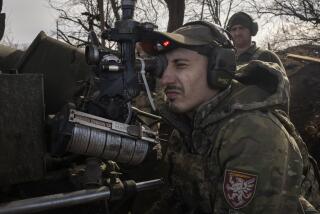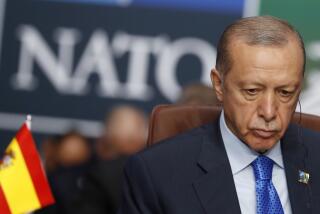Turkey OKs Sending of Troops to Iraq
- Share via
ANKARA, Turkey — The Turkish parliament voted solidly Tuesday to authorize sending thousands of troops to Iraq, in a move chiefly designed to improve ties with Turkey’s main ally, the United States.
But members of the U.S.-appointed Iraqi Governing Council immediately signaled opposition to the deployment of Turkish troops in their country. Kurds, in particular, are concerned about Turkish influence in Kurdish areas of northern Iraq. The council, however, stopped short of issuing a formal resolution opposing the deployment.
The 358-183 parliamentary vote made Turkey the largest Muslim-majority country to agree to serve alongside U.S.-led forces in Iraq. Relations between the United States and Turkey soured early this year after parliament rejected a bill that would have allowed 60,000 U.S. troops to use Turkey as a launching pad for a northern front against Saddam Hussein’s forces.
In a stormy closed-door session, Turkish lawmakers approved a bill giving the government a broad mandate to dispatch troops overseas for a year, without specifying how many or where. Deputies opposing the measure, largely from the main opposition Republican People’s Party, charged that Turkey would become an occupation force in Iraq along with the United States.
Recent polls indicate that 70% of Turks are opposed to sending troops to Iraq, which neighbors Turkey to the south. Members of the opposition have accused the government, dominated by the Islamist-rooted Justice and Development Party, of “marketing Turkish soldiers’ lives” in exchange for an $8.5-billion loan granted by Washington last month. U.S. officials have denied any link between that loan and the dispatching of Turkish troops.
With 500,000 troops under arms, the Turkish military is NATO’s second-largest and is a majority conscription force. “This is a very risky venture for the government because there will almost certainly be body bags coming back,” said Dogu Ergil, a Middle East expert at Ankara University.
Although Kurdish members of the Governing Council are particularly leery of the notion of Turkish troops in Iraq, council members from other religious and ethnic groups, including Iraq’s majority Shiite Muslims, also have spoken against the deployment of any foreign troops.
Associated Press quoted a Kurdish council member, Mahmoud Othman, as saying that only U.S. pressure had prevented the council from issuing a statement formally opposing a Turkish deployment.
“The council already has said it does not want other foreign troops in the country because it believes such a move will complicate the issue,” Othman said.
A spokesman for the U.S.-led Coalition Provisional Authority, which administers Iraq, confirmed that the Governing Council had discussed the issue, but he refused to comment on the outcome of those talks.
Council decisions can be overruled by U.S. officials, but any open show of disagreement would be politically awkward.
Turkey rejects claims that it is seeking more influence in Iraq’s north, saying its principal aims are to help stabilize Iraq and aid the Iraqis in rebuilding their war-shattered infrastructure. “The fact that the deployment is limited to one year shows that Turkey will not be part of the occupation there,” Turkish Foreign Minister Abdullah Gul said Tuesday. “We are not planning only a force, but also [humanitarian] assistance and services for the Iraqi people.”
Gul declined to specify how many troops would be sent to Iraq or when.
Turkish media reports, termed credible by Western diplomats here, said that as many as 10,000 troops from Turkey’s 1st Tactical Division and 28th Mechanized Infantry Brigade would be deployed in a predominantly Sunni Muslim desert area stretching west of Baghdad to the Syrian and Jordanian borders once terms and conditions of their duties were finalized with the Americans.
But just how they will get there is another of the many challenges facing Turkey and the Pentagon. The Iraqi Kurds, the Turks’ fiercest detractors in Iraq, have vowed to prevent Turkish troops from using their territory to cross into Iraq. They say the Turks’ real aim is to undermine the Kurds’ dozen-year autonomy in the north.
For their part, Turkey’s powerful armed forces are concerned about the emergence of a Kurdish homeland, fearing that it would rekindle separatist passions among Turkey’s own 12 million Kurds.
“Once again, instead of seeking to solve its own Kurdish problem at home through democratic means, Turkey is seeking to do so through military measures beyond its own borders,” said Ergil, the academic. “It’s the wrong reason to send soldiers to Iraq.”
*
Special correspondent Za- man reported from Ankara and Times staff writer King from Baghdad.
More to Read
Sign up for Essential California
The most important California stories and recommendations in your inbox every morning.
You may occasionally receive promotional content from the Los Angeles Times.













